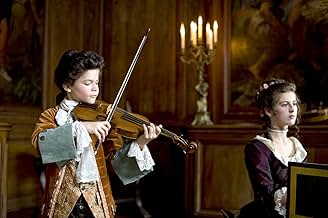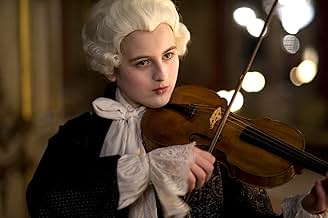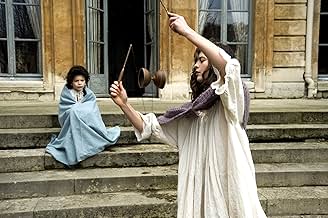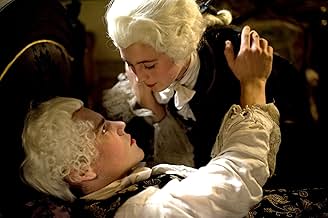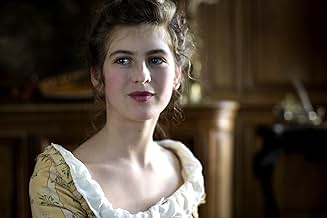IMDb RATING
6.4/10
1.6K
YOUR RATING
A reimagined account of the early life of Maria Anna 'Nannerl' Mozart, five years older than Wolfgang, and a musical prodigy in her own right.A reimagined account of the early life of Maria Anna 'Nannerl' Mozart, five years older than Wolfgang, and a musical prodigy in her own right.A reimagined account of the early life of Maria Anna 'Nannerl' Mozart, five years older than Wolfgang, and a musical prodigy in her own right.
- Awards
- 2 wins & 8 nominations total
- Director
- Writer
- All cast & crew
- Production, box office & more at IMDbPro
Featured reviews
It seems very tempting, Mozart's Sister – the opportunity of another 18th century costume picture, this one from France – produced, written and directed by René Féret. For those who enjoy historical fiction, the film poses as yet one more chance to unlock the doors and peer into the family closets of composer Wolfgang Amadeus Mozart. After all, it's been twenty-seven years since the spectacular emergence of director Milos Forman's Amadeus, which gathered eight Oscars, including Best Picture – as well as for the author of its screenplay, Peter Shaffer, adapting and shaping his multi-Tony Award-winning theatrical masterpiece into iconic cinematic genius. Since the 1984 premiere of Amadeus, business continues to boom in the Mozart industry; a chance at playing either of the Leading Roles of the so-called "rivals" – Mozart and (the nearly forgotten and second-rate) composer Antonio Salieri – continue to inflame the ambitions of many a stage actor; and a recent release of the film into Blu-Ray format proves that Amadeus is here to stay and guaranteed a re-incarnation into whatever format is on the horizon. Mozart's Sister is destined for landfill.
Amadeus and Mozart's Sister are both of the "re-imagined" variety. In other words, for its authors, Truth is but an adjunct to Creative License. Re-imagining the adventures of the Mozart family begins somewhere in a flurry of sheet music, ribbon-bound letters, yellowing diaries, and stories heard around any Music Conservatory. Somewhere in this reverie, René Féret and Peter Shaffer both employ the same controlling gimmick — "I coulda been somebody!" For Shaffer, Salieri knows his musical gifts are lacking, but the Viennese Court doesn't know it until Mozart suddenly shows up. According to Féret, Mozart's sister Nannerl believes that – had she been born as Wolfgang's brother – they might have become the first European Dynamic Duo. No need for Certitude here. "Re-imagined" needs just a few facts and figures, but the finished product requires the entertainment value of Barnum & Bailey. Mozart's Sister wouldn't qualify for a side show.
René Féret's shooting script of Mozart's Sister cannot avoid comparison to Amadeus. Peter Shaffer nurtured his idea through the disciplines of live Theatre. The structure and rhythm of his re-imagined Amadeus is developed through much rehearsal and three continuous years on Broadway before he re-vamps the script for Hollywood. By contrast, Féret's end product is a plodding, witless and gloomy bore. His treatment of the premise that Nannerl Mozart is a suppressed and thwarted genius composer with Box Office appeal similar to that of her brother's – is limp and void of artistic climax. Likewise, there's no satisfaction to be had in the tedious and anemic performances rendered by Féret's daughters – Marie as "Nannerl" and Lisa as "Louise of France".
Salieri, on the other hand, would applaud Mozart's Sister for its inherent mediocrity.
Amadeus and Mozart's Sister are both of the "re-imagined" variety. In other words, for its authors, Truth is but an adjunct to Creative License. Re-imagining the adventures of the Mozart family begins somewhere in a flurry of sheet music, ribbon-bound letters, yellowing diaries, and stories heard around any Music Conservatory. Somewhere in this reverie, René Féret and Peter Shaffer both employ the same controlling gimmick — "I coulda been somebody!" For Shaffer, Salieri knows his musical gifts are lacking, but the Viennese Court doesn't know it until Mozart suddenly shows up. According to Féret, Mozart's sister Nannerl believes that – had she been born as Wolfgang's brother – they might have become the first European Dynamic Duo. No need for Certitude here. "Re-imagined" needs just a few facts and figures, but the finished product requires the entertainment value of Barnum & Bailey. Mozart's Sister wouldn't qualify for a side show.
René Féret's shooting script of Mozart's Sister cannot avoid comparison to Amadeus. Peter Shaffer nurtured his idea through the disciplines of live Theatre. The structure and rhythm of his re-imagined Amadeus is developed through much rehearsal and three continuous years on Broadway before he re-vamps the script for Hollywood. By contrast, Féret's end product is a plodding, witless and gloomy bore. His treatment of the premise that Nannerl Mozart is a suppressed and thwarted genius composer with Box Office appeal similar to that of her brother's – is limp and void of artistic climax. Likewise, there's no satisfaction to be had in the tedious and anemic performances rendered by Féret's daughters – Marie as "Nannerl" and Lisa as "Louise of France".
Salieri, on the other hand, would applaud Mozart's Sister for its inherent mediocrity.
I found this to be an enjoyable period drama about the Mozart family. Remember it is a French made film, made in French language. Top notch English subtitles are necessary on DVD. I doubt the movie, released in the autumn of 2011, would have got worldwide cinema attraction.
Most of us watching would not know the story of Wolfgang Mozarts sister and I have no special interest in classical music, though as a tourist, yes, I did once visit Salzburg.
The film centres around the maturity of the young Nanna and her exploitable musical potential while in friendship at least with the French Dauphin.
The movie contains too much talking overall and I usually like French movies for that but not this time. I liked the acting and the costume drama and I liked the story itself, though two hours is definitely too long and for a non French speaking audience, not many are going to stay until the end. I nodded off the first time after 30 minutes and gave the film a late afternoon re-viewing earlier this afternoon.
Nothing offensive or conspiratorial about the movie. It simply dramatise a story from a book published a few years ago. Enjoy the movie for what it is and do not expect too much.
The music does come across as a little false and overdone but 6 from 10 is about right pitch for its rating.
Most of us watching would not know the story of Wolfgang Mozarts sister and I have no special interest in classical music, though as a tourist, yes, I did once visit Salzburg.
The film centres around the maturity of the young Nanna and her exploitable musical potential while in friendship at least with the French Dauphin.
The movie contains too much talking overall and I usually like French movies for that but not this time. I liked the acting and the costume drama and I liked the story itself, though two hours is definitely too long and for a non French speaking audience, not many are going to stay until the end. I nodded off the first time after 30 minutes and gave the film a late afternoon re-viewing earlier this afternoon.
Nothing offensive or conspiratorial about the movie. It simply dramatise a story from a book published a few years ago. Enjoy the movie for what it is and do not expect too much.
The music does come across as a little false and overdone but 6 from 10 is about right pitch for its rating.
Wolfgang Mozart's older sister was exceptionally talented. And, as she grew, her family discouraged her and put all their energy into her brother and pushed her to marry and have a family. All this is shown in the film and cannot really be refuted. However, the filmmaker's have decided to take some liberties--to ASSUME certain things about Maria Mozart that we simply do not know to be true today. In that sense, it's quite a bit like "Amadeus"--fictionalizing history a bit here and there. The story has a strong feminist bent--and even goes so far as to attribute much of Wolfgang's talent to her! This is rather dubious, as Wolfgang clearly was insanely gifted. It's an intriguing idea--but there really isn't any basis for this assertion. Now this complete fiction COULD have worked--but the rest of the story is incredibly dull--very, very mannered, slow and lacking anything to hook the viewer. 'What if' just isn't enough to carry the rest of the film and I felt EXTREMELY restless as the film progresses. My butt also fell asleep--and it's a great judge of whether or not a film is too tedious!
Stop me if you've heard this one before: Mozart, that legendary impresario, had an sibling who actually helped write a lot of his early work, and got precisely no credit for it... due to the sexist society at the time. She was also a brilliant violinist, but was forced to play the harpsichord by her father as the violin 'was no instrument for a lady.' Meanwhile, everyone mooned over her brother, the 'child prodigy', leaving her completely in the shade. In fact, a lot of what she could have achieved she didn't thanks to the patriarchal beliefs back in the 18th century, and by the sound of the epilogue she had a pretty miserable life after she gave up on all her hopes and dreams. Nice.
How much of this has a basis in reality I don't know, but I suspect there's a fair bit of airbrushing of history here. What can't be denied though, is this is a well acted drama of family ties and unfulfilled potential, full of wonderful classical music and handsome costumes. This is strictly a placid affair... You're not going to see any fireworks going off, and some people may find it all a bit too stagy. But Nannerl is a captivating lead, and while her story might not be 100% accurate as depicted here, it's well worth investing the nearly two hours to discover it. And isn't that really what matters, at the end of the day? 6/10
How much of this has a basis in reality I don't know, but I suspect there's a fair bit of airbrushing of history here. What can't be denied though, is this is a well acted drama of family ties and unfulfilled potential, full of wonderful classical music and handsome costumes. This is strictly a placid affair... You're not going to see any fireworks going off, and some people may find it all a bit too stagy. But Nannerl is a captivating lead, and while her story might not be 100% accurate as depicted here, it's well worth investing the nearly two hours to discover it. And isn't that really what matters, at the end of the day? 6/10
I found "Mozart's Sister" on Amazon Prime Video to stream for free. I'm a musician myself of almost a decade playing guitar, bass, and drums. Several years ago in high school I was in an advanced choir that covered some of Mozart's work. Since then I was always fascinated with Mozart. Who was he, why was he such a musical genius? Why did he die so young? The history and sound of Mozart continues to fascinate me and when I seen this film on Amazon Prime, I had to check it out.
Mozart's Sister revolves around the story of Nannerl Mozart (Maria Anna Mozart), the older sister of the musical genius that is Wolfgang Amadeus Mozart. Despite my fascination and reading into Mozart, I knew nothing of him having a sister. I watched this film all in French with English subtitles, but that didn't hurt the quality of the film. Mozart's Sister is a great film. The camera work, costumes, music, and the works, all 110% authentic. There are no visible flaws of any kind in the film work.
The whole movie revolves around a teenage/young adult Maria Anna Mozart. We get to see how she herself was a magnificent instrumentalist and composer that nearly rivaled her brothers musical abilities. But because of sexism and social status in mid 1700's Europe, she was often pushed aside and disregarded in favor for her brother's work. We also get to see the rest of the Mozart family, Mozart's father who taught them music and his mother.
All and all I enjoyed this film. But I will say, it's not for everybody. If you're not into Mozart or his history, foreign films with subtitles, or movies about mid-1700 music, then maybe you should pass. This does feel like something you would watch in a schoolroom more than something you would watch on a Friday night. Also, "Mozart's Sister" has it's dull moments at times, and the movie never really evolves into anything more than Marianne's early years. We don't get to see her grow up, go through her brothers death later in life, or anything along those lines. I felt if we got to see more of her older life it would have been more grabbing. Still, good movie, average rating of 7/10, good movie with great cinematic/sound work, good acting, just had a few low points that stopped it from being a great movie.
Mozart's Sister revolves around the story of Nannerl Mozart (Maria Anna Mozart), the older sister of the musical genius that is Wolfgang Amadeus Mozart. Despite my fascination and reading into Mozart, I knew nothing of him having a sister. I watched this film all in French with English subtitles, but that didn't hurt the quality of the film. Mozart's Sister is a great film. The camera work, costumes, music, and the works, all 110% authentic. There are no visible flaws of any kind in the film work.
The whole movie revolves around a teenage/young adult Maria Anna Mozart. We get to see how she herself was a magnificent instrumentalist and composer that nearly rivaled her brothers musical abilities. But because of sexism and social status in mid 1700's Europe, she was often pushed aside and disregarded in favor for her brother's work. We also get to see the rest of the Mozart family, Mozart's father who taught them music and his mother.
All and all I enjoyed this film. But I will say, it's not for everybody. If you're not into Mozart or his history, foreign films with subtitles, or movies about mid-1700 music, then maybe you should pass. This does feel like something you would watch in a schoolroom more than something you would watch on a Friday night. Also, "Mozart's Sister" has it's dull moments at times, and the movie never really evolves into anything more than Marianne's early years. We don't get to see her grow up, go through her brothers death later in life, or anything along those lines. I felt if we got to see more of her older life it would have been more grabbing. Still, good movie, average rating of 7/10, good movie with great cinematic/sound work, good acting, just had a few low points that stopped it from being a great movie.
Did you know
- GoofsNear the opening of the film, Nannerl tells Louise that she is 14, almost fifteen. This place the action in the winter of 1765-66. While the character Louise says she is 13, the real Louise would have been 28 years old. In fact, the princess return to court from the Abbey of Fontevraud in 1750, the year before Nannerl's birth.
- How long is Mozart's Sister?Powered by Alexa
Details
- Release date
- Country of origin
- Official sites
- Language
- Also known as
- Chị Gái Của Mozart
- Filming locations
- Production companies
- See more company credits at IMDbPro
Box office
- Budget
- $4,500,000 (estimated)
- Gross US & Canada
- $707,885
- Opening weekend US & Canada
- $34,046
- Aug 21, 2011
- Gross worldwide
- $1,380,379
Contribute to this page
Suggest an edit or add missing content


